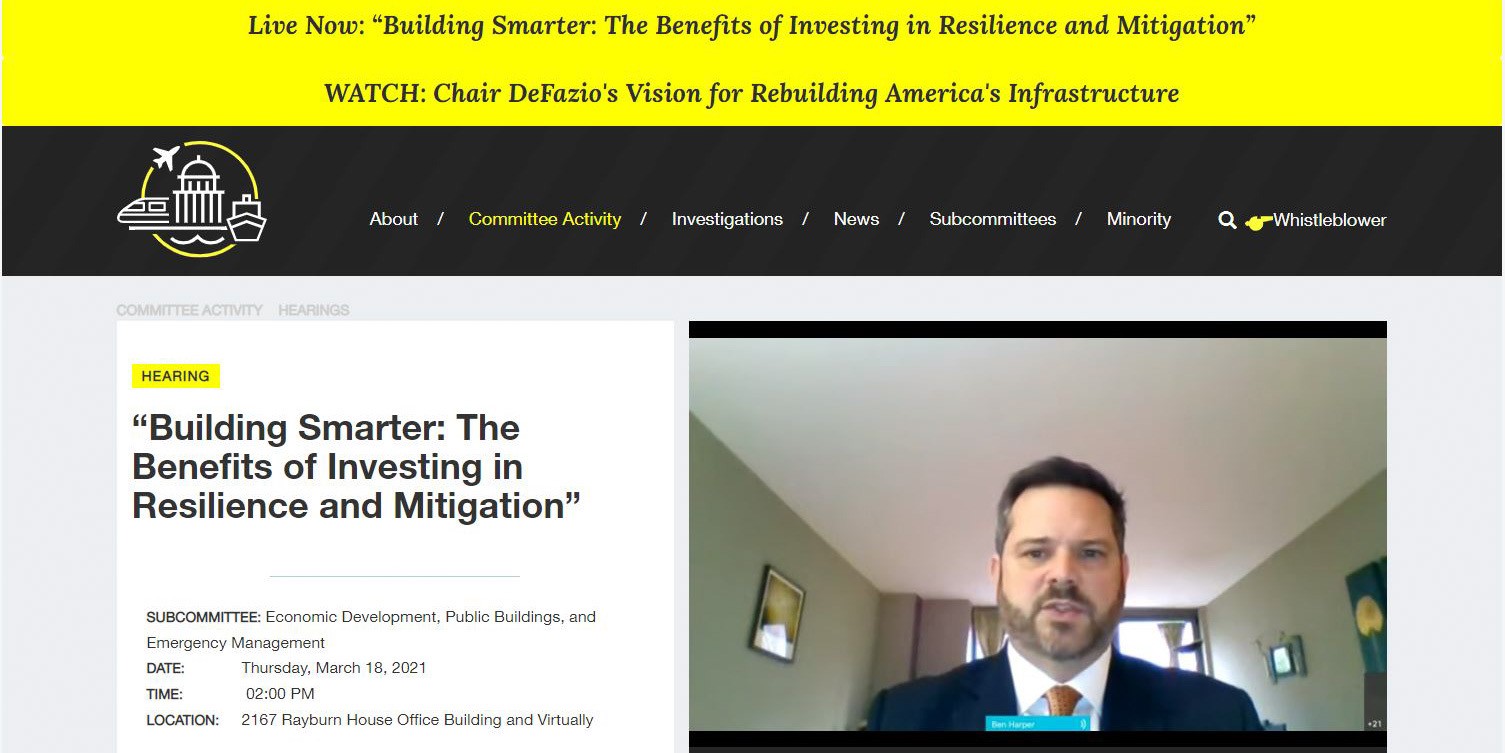

Sustainability Head Ben Harper provides D.C. testimony on importance of investing in mitigation
Share this

Identifying climate change as perhaps the most complex risk facing society today, North America Head of Corporate Sustainability Ben Harper testified at a congressional hearing on March 18 about the need to invest in resilience and mitigation to protect communities in a world where severe weather has become the norm.
“Given the trends that are occurring in the frequency and severity of weather events, we are again sounding the alarm,” Ben told members of the U.S. House of Representatives Committee on Transportation and Infrastructure – Subcommittee on Economic Development, Public Buildings, and Emergency Management. “Investing in mitigation measures, including resilient infrastructure, nature-based solutions and low-carbon technologies, is required if society is to continue to operate with the continuity and resiliency that is expected.”
Now that the Biden administration has released its $2 trillion infrastructure proposal and with the U.S. Congress pressing ahead to draft infrastructure legislation, Zurich will continue advocating for the inclusion of strong resiliency and investment in pre-disaster mitigation measures. Citing Zurich’s analysis that “every $1 spent on resiliency upfront resulted in $5 savings post-disaster,” Ben emphasized the need for and value of investing in mitigation and resilient infrastructure in his virtual testimony.
“We are at a crossroads with regard to aging structures and, combined with the significant increase in severe weather events, we can no longer afford to deploy temporary or band-aid fixes,” he said. “Our aim at Zurich is ultimately to incentivize the behaviors and best practices that will be required to both mitigate the worst impacts and adapt to changing weather patterns.”
Ben also explained that Zurich advocates for resilience because it’s the right thing to do. “Furthermore, from an industry perspective, we do this because the impact of extreme weather events is escalating, and without enhancing resiliency and mitigation measures, many assets may simply become uninsurable,” he summarized.
By Tom Santos
Assistant Vice President for Federal Affairs

Sustainability Head Ben Harper provides D.C. testimony on importance of investing in mitigation
Share this

Identifying climate change as perhaps the most complex risk facing society today, North America Head of Corporate Sustainability Ben Harper testified at a congressional hearing on March 18 about the need to invest in resilience and mitigation to protect communities in a world where severe weather has become the norm.
“Given the trends that are occurring in the frequency and severity of weather events, we are again sounding the alarm,” Ben told members of the U.S. House of Representatives Committee on Transportation and Infrastructure – Subcommittee on Economic Development, Public Buildings, and Emergency Management. “Investing in mitigation measures, including resilient infrastructure, nature-based solutions and low-carbon technologies, is required if society is to continue to operate with the continuity and resiliency that is expected.”
Now that the Biden administration has released its $2 trillion infrastructure proposal and with the U.S. Congress pressing ahead to draft infrastructure legislation, Zurich will continue advocating for the inclusion of strong resiliency and investment in pre-disaster mitigation measures. Citing Zurich’s analysis that “every $1 spent on resiliency upfront resulted in $5 savings post-disaster,” Ben emphasized the need for and value of investing in mitigation and resilient infrastructure in his virtual testimony.
“We are at a crossroads with regard to aging structures and, combined with the significant increase in severe weather events, we can no longer afford to deploy temporary or band-aid fixes,” he said. “Our aim at Zurich is ultimately to incentivize the behaviors and best practices that will be required to both mitigate the worst impacts and adapt to changing weather patterns.”
Ben also explained that Zurich advocates for resilience because it’s the right thing to do. “Furthermore, from an industry perspective, we do this because the impact of extreme weather events is escalating, and without enhancing resiliency and mitigation measures, many assets may simply become uninsurable,” he summarized.
By Tom Santos
Assistant Vice President for Federal Affairs




